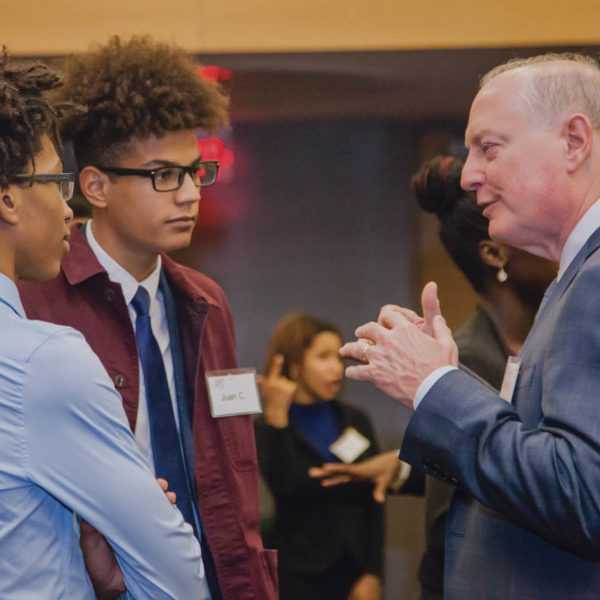Big Companies Give Big: Responding to COVID-19 and Social Justice


During a year when millions of Americans struggled financially due to the economic fallout of the COVID-19 pandemic, and millions of protestors worldwide took to the streets marching for social justice in the U.S., many companies still managed to increase both their earnings and their brand power. While social critics have found this dichotomy of 2020 to be troubling, it needs to be remembered that successful businesses didn’t stint on their charitable contributions.


Companies also receive tax benefits for their corporate social responsibility efforts, and those benefits increased last year. The CARES Act, passed in March 2020, enabled corporations to donate cash or food inventory and receive tax deductions of as much as 25%, up from 10%. Corporate philanthropy and corporate social responsibility (CSR) campaigns also allow firms to indirectly enhance public awareness of their products, and potentially increase their sales and even boost their stock prices.
Charles points out that when corporate philanthropy is viewed through a strategic lens, it can have enormous impact. He cites as examples Exxon Mobil’s 2019 investment of $253 million worldwide toward initiatives that include education, health, and workforce development, and Microsoft’s donation of $1.4 billion last year in software and services to nonprofits worldwide to help build community, workforce, and education accessibility.
Numerous household names donated vast sums and reached a huge amount of people through their contributions last year. The recipients of those gifts ranged from individuals to nonprofit organizations. While much of the money was meant to address the impact of the coronavirus, a significant amount also went toward racial justice and other social issues. In many cases, companies that focused on these causes demonstrated charitable priorities that differed from those of their 2019 donations.
Here is a look at how some well-known companies approached philanthropy in 2020 and before.
AMAZON
Amazon donated more than $30 million to COVID-19 research and PPE supplies in 2020, and supported more than 1,000 charities around the world during the holiday season with product and monetary donations to help people receive millions of items of clothes, food, and other household goods. In addition, AmazonSmile donates 0.5% of shoppers’ eligible purchases to the charitable organization of their choice. Millions of Amazon customers participate in the program, which is free to them. .
The year before, Amazon donated hundreds of thousands of items to hundreds of charities nationwide, based on requests those organizations made online through their own AmazonSmile Charity Lists. In 2019, the company donated over 5,000 blankets, sheets, and pillows; 30,000 children’s toys and educational products; 40,000 pairs of socks, shoes, outerwear, pajamas, and other apparel; as well as more than 60,000 food and water packages. That year, Amazon also donated over $1 million in money and goods to charities for the homeless. Recipients included Project Hospitality, based in New York City; Second Harvest Food Bank of Middle Tennessee; and Purrfect Pals Cat Sanctuary in Arlington, Washington.
WALMART
After the national and global civil rights protests that unfolded in 2020 in response to controversial police killings of unarmed Black people, Walmart and the Walmart Foundation announced they will dedicate $100 million over the next five years to a new Center for Racial Equity with the goal of targeting the root causes of systemic racism in the financial system, healthcare, education, and criminal justice. In fiscal year 2020 — from Feb. 1, 2019, to Jan. 31, 2020 — Walmart donated over $1.4 billion globally to a wide assortment of causes. In June of 2019, Walmart announced plans to give community grants of nearly $70 million in FY 2020.
In FY 2019, Walmart donated more than $42 million to community giving projects and donated over 640 million pounds of food to U.S. food banks. Throughout calendar year 2019, the Walmart Foundation made $4.8 million in grants to help small farmers in India and up to $250,000 in grants to help first responders battling California wildfires, while the company matched up to $1.5 million in grants for nonprofits in El Paso, Texas. That year, Walmart, the Walmart Foundation, and Sam’s Club committed $500,000 in cash and in-kind donations for Hurricane Dorian relief recovery in the Carolinas and the Bahamas.
JPMORGAN CHASE
Soon after the pandemic struck, JPMorgan Chase donated $50 million to global emergency relief efforts, and distributed the funds in coordination with nonprofits operating across the U.S., Europe, and China. The J.P. Morgan Charitable Giving Fund (a donor-advised fund) provided 21,900 grants worth a combined $919.1 million to more than 9,600 nonprofits in FY 2020 (from July 1, 2019, to June 30, 2020). The Fund reached 20% more charitable recipients and generated 47% more giving compared to the previous fiscal year.
Each calendar year, the company and the JPMorgan Chase Foundation donates approximately $250 million to nonprofits across the U.S. and in 38 other nations to help foster causes such as community revitalization, local business growth, and environmental protection. In 2018, JPMorgan announced plans to increase community-focused philanthropic investments by 40% over the following five years, to $1.75 billion. In January 2019, the bank also donated $1 million to help furloughed workers affected by the monthlong partial federal government shutdown.
JOHNSON & JOHNSON
In January 2020, Johnson & Johnson’s Center for Health Worker Innovation announced it would donate $250 million to frontline health workers. Two months later, Johnson & Johnson and the Johnson & Johnson Foundation dedicated $50 million for frontline health workers battling COVID-19. In November, Johnson & Johnson announced it would raise $100 million over the next five years to improve equity in healthcare for Black and brown people and their communities nationwide. It also plans to provide college scholarships to Black students studying STEM, business, or healthcare.
In 2019, Johnson & Johnson announced it would increase its donations of medication for fighting intestinal worm disease in children, through a partnership with the World Health Organization, from 200 million between 2006 and 2020 to another 1 billion doses between 2021 and 2025. The same year, the company committed to donate as many as 500,000 doses of a vaccine to fight Ebola in the Democratic Republic of Congo. Its Center for Health Worker Innovation also was founded in 2019, to address the global shortfall in nurses, midwives, and community caregivers through education, financing, and technological support.
SPANX
Sara Blakely is the founder of women’s shapewear maker Spanx and the Spanx By Sara Blakely Foundation (SBF). In April, the philanthropic organization responded to the pandemic by donating $50,000 to the United Nations Foundation’s COVID-19 Response Fund, and by donating more than $5 million to establish the Red Backpack Fund for U.S.-based women entrepreneurs. The Red Backpack Fund worked with GlobalGiving, which connects nonprofits with donors and companies, to distribute 1,000 grants of $5,000 each. Last year, SBF also donated to projects at high schools, restaurants and the United Nations.
The SBF donated to similar causes in 2019, prior to the pandemic. This encompassed $500,000 to Vital Voices, a nonprofit for women leaders tackling global challenges; grants of $5,000 each to nine women entrepreneurs at the Atlanta-based Center for Civic Innovation; sponsoring a Habitat for Humanity home build for a single mother; serving as lead sponsor of an Atlanta Film Festival program for women directors and crews; and supporting the GCAPP nonprofit dedicated to promoting the education and health of kids living in Georgia.
GUY FIERI
The sunglasses-wearing, goateed celebrity chef Guy Fieri is a one-man brand whose success extends to restaurants, books, and television shows. Fieri helped raise approximately $22 million in seven weeks for over 43,000 food workers, through the Restaurant Employee Relief Fund, which he started shortly after COVID-19 triggered closures began devastating the industry. More than 50 companies and 15,000 individual donors contributed to the fund, which provided one-time $500 grants to restaurant workers in all 50 states.
A separate organization, the Guy Fieri Cooking With Kids Foundation, was formed in 2010 to encourage young people to learn culinary arts. The nonprofit has donated pretzel carts to schools as a way to teach kids about running a small business and to help them fundraise for extracurricular activities. The carts are an homage to Fieri’s own childhood business venture of selling pretzels at age 10. According to IRS Form 990 filings available on ProPublica, the Petaluma, California-based charity raises anywhere between $100,000 and $500,000 per year.

